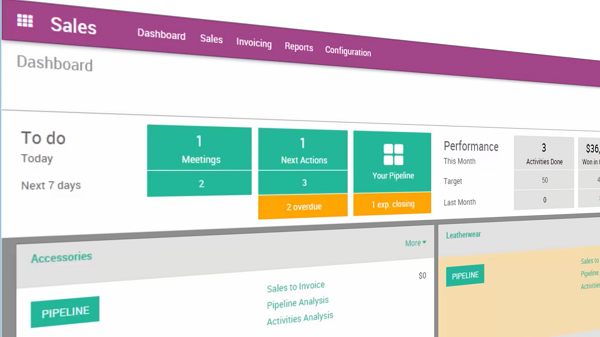Choosing an Enterprise Resource Planning (ERP) system is a critical decision that will impact your business in the next 5 to 15 years. Odoo and NetSuite are two leading ERP solutions, each with distinct strengths. This comparison explores their features, costs, adaptability, and implementation approaches to help businesses make an informed decision.
Understanding Odoo and NetSuite
Odoo is a modular, open-source ERP system designed to adapt to businesses of all sizes. Its flexibility allows companies to implement only the modules they need and expand seamlessly. With a modern interface and an intuitive user experience, businesses can quickly streamline operations.
NetSuite, a cloud-based ERP from Oracle, provides a suite of applications covering financials, customer relationship management (CRM), and e-commerce. It is designed for mid-sized to large enterprises and offers a predefined structure suited for more complex needs.
Cost Efficiency
- Odoo: The Community Edition is free but the paid Enterprise Edition provides access to advanced features with a cost-effective pricing model with a price per user per month with unlimited usage of all the modules. Its transparent pricing ensures businesses have control over their ERP investment.
- NetSuite: Operates on a subscription-based pricing model, which includes licensing fees, user-based costs, and additional charges for modules. This structured pricing can result in higher overall costs, especially for growing businesses requiring scalability.
Customisation and Adaptability
- Odoo: With its open-source foundation, Odoo offers seamless customisation, empowering businesses to configure workflows, automated actions, integrate third-party applications, and tailor processes without heavy development overheads. Its modular structure allows businesses to scale their system organically as they evolve. Odoo also comes with Studio that enables you to customise your database with a No-Code approach.
- NetSuite: Customisation is possible but requires dedicated consultants and proprietary tools, leading to extended implementation timelines and higher costs. Adjusting workflows may involve significant investment in NetSuite-certified developers.
Implementation and Support
- Odoo: Implementation is guided by an extensive network of certified partners, ensuring local expertise tailored to industry-specific requirements. Businesses have the option to implement in-house, with partner support, or through Odoo’s implementation services, allowing for greater flexibility and cost control.
- NetSuite: Implementation follows a structured, consultant-led approach, requiring dedicated resources to configure and deploy the system. Due to its complexity, businesses may require ongoing consultant support to optimise usage.
Scalability and Growth Potential
- Odoo: Designed to grow alongside businesses, Odoo’s modular framework allows organisations to add functionalities as they expand. Whether integrating additional business units or expanding operations, Odoo ensures a cohesive and scalable approach without incurring unnecessary costs.
- NetSuite: Built for enterprise scalability, NetSuite is ideal for businesses with multi-entity structures. However, scaling requires higher investment due to its licensing model and additional costs for new modules or features.
Compliance and Localisation in Australia
- Odoo: Australian businesses can ensure compliance through localised modules and integrations developed by Odoo partners. With solutions for GST, payroll, and regulatory reporting, businesses can easily configure Odoo to meet statutory requirements. See why 85% of Australian SMEs prefer Odoo
- NetSuite: Offers localisation packs for Australian compliance, covering GST, Single Touch Payroll (STP), and BAS reporting. These features come at a premium, increasing the cost of adoption.
Choosing the Right ERP for Your Business
When selecting an ERP, businesses should assess operational needs, growth plans, and budget considerations. Both Odoo and NetSuite provide extensive functionality, but their approach and cost structures differ. Businesses requiring flexibility and modularity may find Odoo a strong fit, while those seeking a structured enterprise solution might consider NetSuite’s predefined framework.
Not sure if you need an ERP or a CRM? Compare the core functionalities
Talk to an Odoo Expert
Odoo’s modern, scalable, and cost-efficient approach makes it an ideal ERP for businesses across industries. If you are considering Odoo or exploring alternatives to NetSuite, our team of Australian Odoo experts is here to assist.
Contact us today to explore how Odoo can transform your business operations.


